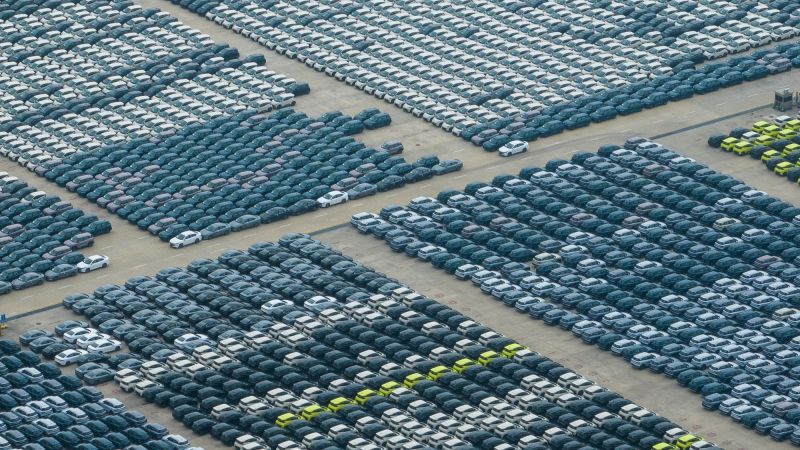London
CNN
—
The European Union has hiked tariffs on electric cars imported from China in a move likely to infuriate Beijing and rattle Chinese automakers, which view the bloc as a vital and growing market.
The increased duties will range from 17.4% to 38.1%, up from a flat rate of 10% previously, according to a statement from the European Commission.
The provisional decision follows an investigation into China’s state support for electric vehicle makers. The European Commission, the EU’s executive arm, launched the probe in October to establish whether Chinese EV prices are artificially low because of subsidies, hurting European carmakers.
The Commission said its investigation had provisionally concluded that the EV industry in China “benefits from unfair subsidization, which is causing a threat of economic injury.”
The sharp increase in tariffs, which takes effect next month, highlights the more protective stance on trade with China that Brussels, as well as Washington, are adopting. Western officials are increasingly concerned that domestic jobs and strategically important industries could be wiped out by cheap Chinese imports. The EU is also probing China’s state support for wind turbine companies and solar panel suppliers.
The Commission has applied differing levels of duties to three major EV makers. BYD — which jostles with Tesla (TSLA) for position as the world’s biggest seller of battery EVs — has the lowest duty at 17.1%.
Geely, which owns Sweden’s Volvo, has been hit with a 20% tariff and SAIC with 38.1%. As for other Chinese EV makers, those that cooperated with the EU investigation will see a 21% duty, while those that did not cooperate will be subject to a 38.1% duty.
Europe is already the main destination for Chinese EV exports. Last year, the value of EU imports of electric cars from China stood at $11.5 billion, up from just $1.6 billion in 2020, according to Rhodium Group, a think tank.
The pressure to protect European automakers grew more urgent last month after Chinese EVs were all but priced out of the United States. President Joe Biden quadrupled import duties on Chinese EVs to 100% as part of a sweeping package of tariffs on goods from China, including semiconductors and batteries.
But European officials have competing priorities to consider and so could not be as heavy-handed in their approach. Many European automakers manufacture cars in China and then sell them in Europe. In addition, Germany’s carmakers rely heavily on China for sales, and a retaliation by Beijing against higher EU tariffs could make life harder for them.
While France and Spain favor tariffs, politicians and auto industry executives in Germany are firmly opposed. BMW CEO Oliver Zipse warned Europe to proceed with caution on earnings calls last month, suggesting that tariffs could endanger German carmakers’ global business model.
The new EV tariffs are likely to kick off intense negotiations between Beijing and Brussels aimed at averting a damaging trade war. The EU must decide by November whether to adopt the tariffs permanently.
Beijing’s reaction to the tariffs “could lead to a trade war (with Europe), which would be devastating for a region that is still heavily dependent on Chinese-dominated supply chains in order to achieve its lofty climate goals,” Will Roberts, head of automotive research at consultancy Rho Motion, said in a statement Friday.
Beijing could also target wholly unrelated industries. For example, it has already launched an anti-dumping investigation into brandy imported from the EU and could impose tariffs that would hit French cognac makers.
China’s EV makers, meanwhile, could find ways around the tariffs. BYD pledged in December to open a factory in Hungary, which is a member of the European Union. That would be BYD’s first plant for passenger cars in Europe.











